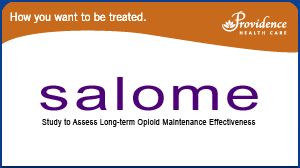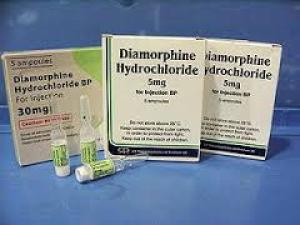Last Friday, Health Canada used some creative rule-reading to approve a program that would provide prescription heroin to a small number of hard-core users, and the Conservative health minister isn't happy. But doctors, advocates, and the users themselves are quite pleased -- and once again, Canada stays on the cutting edge when it comes to dealing smartly with heroin use.

SALOME began at the end of 2011 and has been enrolling participants on a rolling basis for a year at a time. The final group of participants will finish up at the end of next year. It built on the success of the North American Opioid Maintenance Initiative (NAOMI), a study in Vancouver and Montreal from 2005 to 2008. That study found that using heroin is cheaper and more effective than using methadone to treat recalcitrant heroin users.
While the Conservative federal government has been a staunch opponent of heroin maintenance, not to mention also fighting a bitter losing battle to close down the Vancouver safe injection site, Health Canada bureaucrats were able to find a loophole that will allow doctors to prescribe heroin to graduating study participants under the ministry's Special Access Program (SAP).
That program is designed to provide drugs to Canadians with life-threatening illnesses on a "compassionate or emergency" basis. The SAP includes "pharmaceutical, biologic and radiopharmaceutical products that are not approved for sale in Canada." The program covers diseases including intractable depression, epilepsy, transplant rejection and hemophilia, but heroin addiction isn't mentioned.
"Health Canada made a wonderful decision," said Scott Bernstein, Health and Drug Policy Lawyer for the Vancouver-based Pivot Legal Aid Society, which represents 22 SALOME participants and the BC Association of People on Methadone in order to advocate for their continued access to health care and the protection of their human rights. "The decision was one based on the evidence and not ideology. It means that those SALOME participants allowed access can live safer, more stable lives, lives free of crime and remaining under the care of doctors, not drug dealers."
But Health Minister Rona Ambrose appeared to have been caught flat-footed by the Health Canada decision. She issued a statement the same day decrying the move, saying that it contradicted the government's anti-drug stance.

The move is "in direct opposition to the government's anti-drug policy and violates the spirit and intent of the Special Access Program," Ambrose said, adding that she would take action to "protect the integrity of the (SAP) and ensure this does not happen again."
Ambrose's remarks prompted a Monday response from SNAP (the SALOME/NAOMI Patients Association), comprised of "the only patients in North America to be part of two heroin-assisted treatment (HAT) clinical trials" -- NAOMI and SALOME. SNAP noted that European heroin-assisted treatment trials had allowed participants to continue to be prescribed heroin on compassionate grounds after the trials ended and that "heroin-assisted therapy is an effective and safe treatment that improves physical and psychological health when the participants are receiving treatment."
"The Canadian NAOMI trial is the only heroin-assisted treatment study that failed to continue offering HAT to its participants when the trial ended in Vancouver," SNAP said. "We do not want to see the same outcome for the SALOME trial. Currently, SALOME patients are being offered oral hydromorphone when they exit the trial. However, there is currently no scientific evidence to support this treatment option for opiate addiction in the doses required; thus we urge you to reconsider your comments and to support Health Canada's decision to grant special access to heroin for patients exiting the SALOME trial. We also urge Canadians to support the immediate establishment of a permanent HAT program in Vancouver, BC."
Patients and their supporters weren't the only ones supporting the Health Canada move and criticizing Minister Ambrose for her opposition. New Democratic Party health critic Libby Davies also had some choice words for her.
Davies was "outraged" that Ambrose would "overrule her own experts," she said. "Medicalized heroin maintenance has been used very successfully in places like Europe. It's another example of the Conservative government ignoring sound public policy, instead making decisions based on political dogma."
Indeed, while Canada has been on the cutting edge of opiate maintenance in North America, being the scene of the hemisphere's only safe injection site and heroin-maintenance studies, similar moves have been afoot in Europe for some time. Prescription heroin programs have been established in several European countries, such as Switzerland, Germany, Denmark, The Netherlands, and the United Kingdom.
Now, it seems that Canada will join them, despite the health minister's dismay.
This work by StoptheDrugWar.org is licensed under Creative Commons Attribution-ShareAlike 4.0 International
Comments
          Al Capone. ...took
Al Capone. ...took full advantage of the criminal opportunities available during Prohibition.
Prohibition is an absolute plague The use of drugs is NOT the real problem, the system that grants exclusive distribution rights to violent cartels, terrorists, and corrupt politicians most definitely is the problem. Legalize it, regulate it, make it safer, and tax it.
Do a search for Law Enforcement Against Prohibition LEAP
Health Minister Rona Ambrose
Health Minister Rona Ambrose should be informed,
Quoted from Licit & Illicit Drugs, Chapter 13, Supplying Heroin Legally to Addicts.
http://www.DrugLibrary.org/schaffer/Library/studies/cu/CU13.html
* Lawrence Kolb and A. C. Du Mez, The Prevalence and Trend of Drug Addiction in the United States and Factors Influencing It, Treasury Department, U.S. Public Health Service, Reprint No. 924 (Washington, D.C.: U.S. Government Printing Office, 1924), pp. 2-3.
And
I think this is very good news and I hope Health Canada and those involved do not back down.
Great News
Way to go Canada!
Still there are tens of thousands of addicts who could benefit from HAT, the fact that it is being limited to the people who were lucky enough to get in on the SALOME/NAOMI studies is a bit disappointing.
Yes there's always methadone, but not everyone responds well to methadone. Usually to get what everyone knows really works, heroin, you have to fail at other treatments multiple times. So we have a drug which we know works, but we're not going to give it to you until you've ruined your credit, maybe lost your family, been homeless, ect. Only then after all that pain will we give you what really works.
There is really no reason why methadone should be the front line treatment for opiate addiction. It has high oral bioavailability which allows for oral dosing and a long enough half-life to necessitate once-a-day dosing, so from a clinical perspective it is better than heroin.But what's best for the clinic may not be best for the patient. All options should be available. Also what I would like to know is why isn't anyone trying opium? The choices are not limited to heroin or methadone. Opium, smoked or eaten, may work very well. Addicts could even grow their own medicine much like medical marijuana patients do.
Add new comment